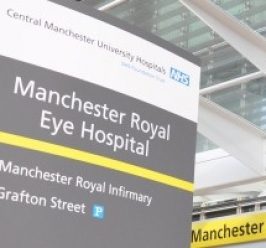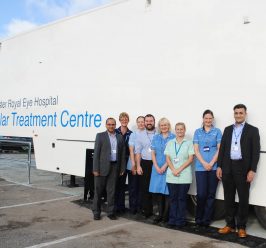About Medical Retinal Services
The Medical Retina team specialise in treating the back of the eye and will oversee any medical intervention needed. This might include the administration of drugs, eye drops, injections and laser treatment.
What conditions do we treat?
The Manchester Royal Eye Hospital provides a variety of services to residents of Greater Manchester and beyond for patients with retinal disorders, these include:
- Age-related macular degeneration
- Diabetic eye disease
- Retinal Vascular occlusions
- Hereditary eye problems such as retinitis pigmentosa
What treatments do we offer?
As a prestigious research and teaching institution the hospital is able to offer the most advanced diagnosis and the latest medical treatments for retinal eye conditions.
To support diagnosis and treatment, the Eye Hospital has access to a number of ophthalmology imaging devices on site, these include:
- Digital fluorescein angiography – this examines the circulation (outside/edge) of the retina
- Fundus/Widefield Optos photography – to document retinal pathology
- ICG (indocyanine green) angiography – to enhance visualization of the choroidal layer, deep to the retina
- Optical Coherence Tomography (OCT) – this allows a cross-sectional image of the retina to be taken
- B-scan ultrasonography – to measure the eye and identify abnormalities in the retina when the retina cannot be visualized
The most common medical retina treatment involves the administration of chemicals by injection into the back of the eye on a regular basis. This can now be done in one four treatment sites around the city. This is a comprehensive, “one-stop” service for patients with age-related macular degeneration, and other conditions requiring regular intravitreal injections. Two of the services are located on the high street to maximise convenience and access for our patients.
Who will I see?
The Eye Hospital has a large body of consultants with expertise in this area providing a high quality service to patients. The team is supported by a team of specialist nurses, optometrists and ophthalmic photographers to provide a comprehensive and patient centred service.

Consultants
- Professor Tariq Aslam - Senior Clinical Lecturer, Consultant Ophthalmologist
- Ms Romi Chhabra - Consultant Ophthalmologist, Clinical Lead for Medical Retina and Macular Services
- Mrs Yvonne D’Souza - Consultant Ophthalmologist - Clinical Lead for Diabetic eye disease
- Miss Nashila Hirji - Consultant Ophthalmologist
- Mrs Amy Stone - Consultant Ophthalmologist
- Dr Marta Ugarte - Consultant Ophthalmologist


